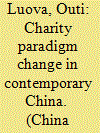| Srl | Item |
| 1 |
ID:
153635


|
|
|
|
|
| Summary/Abstract |
This article addresses a remarkable conceptual change in China: the replacement of the perception of charities as organizations associated with anti-governmental activity by one that views charities as organized expressions of civic duty. This shift occurred within a period of just 20 years. Following theories of public policy paradigm change, this study analyses the specific societal, institutional and rhetorical changes that were required for the rehabilitation of charity in China; the articulation of a blueprint for the new paradigm; and the implementation of the model in practice, focusing on attempts to foster a charitable spirit and culture. This study is based on official documents and articles in the People’s Daily (人民日报). Furthermore, the analysis is complemented by interviews with staff members of charity associations carried out in Tianjin in 2007 and 2008. The findings contribute to the broader discussion of the features of China’s civil society by elaborating on the boundaries of acceptable civic action. The study shows how the party-state has permitted the emergence of a space for the expression of a voluntary charitable spirit while still expecting that charitable spirit to be expressed within the confines of state-defined morally correct acts.
|
|
|
|
|
|
|
|
|
|
|
|
|
|
|
|
| 2 |
ID:
189977


|
|
|
|
|
| Summary/Abstract |
Although there may be disagreement about the consequences of technology, such as the Internet, on Chinese philanthropy, there is consensus that giant tech companies have profoundly reshaped the field. One outcome is that this has led to the rise of digital philanthropy. The extant studies on the impact of the Internet on philanthropic practices tend to be limited to investigations of a specific platform (e.g. Weibo), while overlooking the heterogeneity of tech-empowered digital philanthropy in China. This study is an introduction to the diversity and the platformization of digital philanthropy. We use a snowball sampling online survey (n = 2132) to examine people’s attitudes towards digital philanthropy to understand user perceptions of some of the most common digital philanthropy platforms and products. The sample captures more educated mobile phone users already active on digital platforms. Based on the results, we categorize and discuss the three most mentioned types of digital philanthropy products: event-based products, issue-based products, and gamified mini-programs. We provide some insight on how these philanthropic products are engineered to blur the boundaries between online and offline activities to leverage tech companies’ mega platforms. The platformization of digital philanthropy has potential consequences for the evolving state–business–society relationship.
|
|
|
|
|
|
|
|
|
|
|
|
|
|
|
|